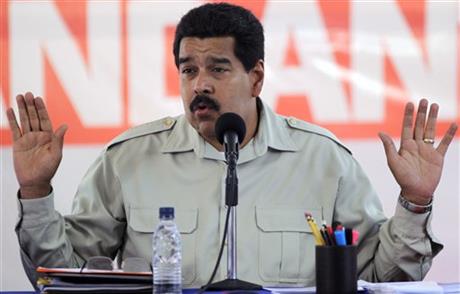
By FABIOLA SANCHEZ
Venezuela’s President Nicolas Maduro speaks at the inauguration of a new branch of the National Experimental Security University (UNES) in Caracas, Venezuela, Friday, Aug. 23, 2013. A months-long anti-corruption campaign by Maduro that began with the arrests of dozens of officials and cronies suspected of pilfering millions from state coffers has devolved into what critics say is a witch hunt against the already-beleaguered political opposition, and what many see as a power grab by an increasingly embattled government. (AP Photo/Ariana Cubillos)
CARACAS, Venezuela (AP) — There is little question Venezuela is a nation in desperate need of an anti-corruption crusade.
Machine-gun toting police in the chaotic capital are widely perceived to be in cahoots with criminals, black marketeers get rich circumventing widely-flouted currency controls, and many politicians who rose to power under the late President Hugo Chavez flaunt lifestyles that appear far too luxurious for their government salaries.
But a months-long campaign by President Nicolas Maduro that began with the arrests of dozens of officials and cronies suspected of pilfering millions from state coffers has devolved into what critics say is a witch hunt against the already-beleaguered political opposition, and what many see as a power grab by an increasingly embattled government.
“The executive has enough powers,” said Mercedes de Freitas, the head of the civil society group Transparency Venezuela. “We have to dilute its power in order to fight corruption, not give it more power.”
In the past two weeks, government corruption probes have increasingly targeted the inner circle of Miranda state Gov. Henrique Capriles, the man who lost a narrow, disputed election in April to Maduro, Chavez’s hand-picked successor.
Maduro last week said he intended to declare “a constitutional emergency” to wage war on graft and ask the National Assembly to grant him special powers to rule by decree, a maneuver Chavez had employed to steamroll radical reforms. It was unclear when that could happen.
In one of the government’s most striking cases targeting members of the opposition, the president personally denounced unspecified corruption that somehow involved a gay and transvestite prostitution ring that has been linked to Oscar Lopez, Capriles’s chief of staff. A Maduro ally released a photo of Lopez in women’s clothing with other men. Lopez has been in hiding since military intelligence raided his apartment on Aug. 7 following a government order for his arrest.
Pro-Maduro legislators also stripped the immunity of opposition deputy Richard Mardo, another Capriles loyalist, saying he can now be prosecuted for alleged tax evasion and hiding some income sources. The opposition calls the allegations fabricated and politically motivated.
Maduro hasn’t said why he launched the anti-corruption campaign, but has warned that traditional political parties behind Capriles are using graft “to eat away at the country in order to regain power.”
Capriles calls the crackdown a “smoke screen” to distract from economic woes, crumbling infrastructure, rampant crime and political repression ahead of Dec. 8 regional elections.
An Information Ministry spokesman did not respond to a request for comment from The Associated Press, but Maduro has denied allegations of a witch hunt against Capriles allies, and Attorney General Luisa Ortega Diaz has said there are many pro-government figures among the 64 people detained in recent weeks.
Those arrested include Luis Gallardo, the former pro-government governor of Guarico state; Carlos Sanchez, the administrator of the tax office in the coastal state of Vargas; Tryno Martinez, national inspections director for the country’s consumer protection agency and Radwan Sabbagh, former president of the state-run iron-ore mining company Ferrominera del Orinoco. In July, four public employees were among eight people arrested for allegedly embezzling more than $84 million from a joint fund shared by Venezuela and China.
But no major government figure has faced charges, and the attention of prosecutors seems to have shifted to the Capriles camp.
Human rights groups warn the pursuit of charges against opposition voices could further stifle free speech, particularly given what they call increased efforts to diminish the influence of independent news organizations.
For his part, Capriles has noted that it is unusual to focus an anti-corruption drive on those out of power.
“This is probably the only government on the planet that attacks the opposition for being corrupt … when corruption is with those who exercise power,” Capriles said recently. He added that if Maduro turned investigators loose on the “big fish” around him “we would be left without a government.”
Corruption is nothing new in Venezuela, which last year ranked 165th of 174 countries in a Transparency International survey of perceptions of corruption, among the worst along with Somalia, Iraq and Afghanistan.
Voters fed up with official corruption first elected Chavez in 1998.
But Chavez publicly acknowledged during his ensuing 14 years in power that graft was a growing threat to his poverty-fighting Bolivarian revolution, even as many of his allies got rich, joining what became known as the “Boli-bourgeoisie.” Yet Chavez largely failed to stem it, and many doubt Maduro will succeed where his charismatic mentor failed, even assuming he really wants to.
Venezuela is deeply divided, with many Chavez and Maduro loyalists convinced that theirs is a people’s revolution against a once-entrenched, corrupt ruling class. Capriles’s backers claim the government has trampled dissent and pays only lip service to democratic norms.
In the middle are many Venezuelans who don’t trust the government’s ability to battle corruption, which has contributed to annual inflation topping 40 percent, food and medicine shortages and one of the world’s highest homicide rates.
“The government does all this to grab attention,” said Rosa Elena Mujica, a 77-year-old retired nurse in the capital’s center. “Here, corruption will continue ruling as long as they don’t punish the fat fish that are in the government. … They become richer and we poorer.”
___
Associated Press writer Frank Bajak in Lima, Peru, contributed to this report.



